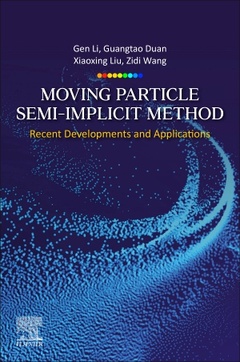Moving Particle Semi-implicit Method Recent Developments and Applications
Auteurs : Li Gen, Duan Guangtao, Liu Xiaoxing, Wang Zidi

Moving Particle Semi-implicit Method: Recent Developments and Applications offers detailed step-by-step guidance for advanced numerical models in the MPS method. With a strong focus on overcoming challenges, such as low improving accuracy and numerical stability, the book also examines the applications of MPS, particularly within nuclear engineering. Beginning with an introduction to grid-based and particle-based numerical methods, the book then reviews the original MPS method. Following chapters examine how the original method can be improved, covering topics such as improved discretization models, stabilization methods, multiphase flow and turbulence models, and improving efficiency.
Closing chapters analyze applications in nuclear and ocean engineering, as well as considering future developments and implications. This book is an essential read for graduates, researchers and engineers interested in nuclear engineering and computational fluid dynamics.
2. Original MPS method
3. Improved discretization models
4. Stabilization methods
5. Boundary conditions
6. Surface tension
7. Multiphase flow and turbulence models
8. Heat transfer models
9. Efficiency improvement
10. Applications in nuclear engineering
11. Applications in ocean engineering
12. Perspective
Guangtao Duan is a Project Assistant Professor at The University of Tokyo. He got his PhD degree from Xi’an Jiaotong University, China, in 2016. He worked as postdoctoral researcher in The University of Tokyo (2016-2019) and Waseda University (2017-2019). From 2020, he got his current position at The University of Tokyo. Dr. Duan has done a lot of excellent work on particle method development. He proposed a high-accuracy particle method, sharp interface algorithm in multiphase flow, and advanced solid-liquid and evaporation models. His research has been published on some highly influential international journals. Dr. Duan is also a project principal investigator of the Japan Society for the Promotion of Science.
Xiaoxing Liu is an associate professor at Sun Yat-Sen University. He completed his PhD study in Kyushu University, Japan, in 2012-2015. After that, he worked as postdoctoral research fellow in the same laboratory as his PhD study. In 2020, he joined the faculty of Sun Yat-Sen University. His research interests focus on the meshless particle methods and simulations of
- Presents detailed information on the advanced numerical models in the Moving Particle Semi-Implicit (MPS) method, including the improved discretization scheme, stabilization method, boundary condition, multiphase flow and fluid-structure interaction
- Provides the latest advances in improving the accuracy, stability and consistency of the MPS method
- Highlights the nuclear and ocean engineering applications of MPS
Date de parution : 05-2023
Ouvrage de 266 p.
15.2x22.8 cm
Thèmes de Moving Particle Semi-implicit Method :
Mots-clés :
Artificial viscosity; Boundary condition; Boundary conditions; Bubble dynamics; Challenges of particle method; Collision model; Compressible algorithm; Continuum surface force; Corrective matrix; Elastic structure; Error accumulation; Fluctuation; Fluid–structure interaction; Free surface; GPU acceleration; Gas–liquid two-phase flow; Grid method; Heat transfer; Hybrid method; Improved discretization model; Incompressible algorithm; Inflow and outflow boundaries; Least square MPS; Liquid–gas phase change; MPI model; MPS models; Melt behavior; Mesh-free particle method; Meshfree particle method; Moving particle semi-implicit method; Multiphase flow; Multiresolution model; New generation computational fluid dynamic method; Nuclear reactor severe accident; OpenMP model; Parallelization; Particle method; Particle shifting; Particle stabilized term; Phase change; Potential force; Reactor thermal hydraulics; Robust numerical method; Sediment transport; Smooth particle hydrodynamics method; Solid–liquid phase change; Solid–liquid two-phase flow; Stability; Surface stress; Surface tension; Time-step constraints; Turbulence model; Wall boundary; Water flooding; Wave impact; Wettability



